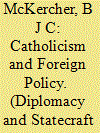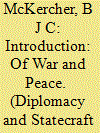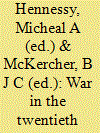|
|
|
Sort Order |
|
|
|
Items / Page
|
|
|
|
|
|
|
| Srl | Item |
| 1 |
ID:
178363


|
|
|
|
|
| Summary/Abstract |
Esme Howard, the British diplomat posted to the Paris Peace Conference to handle policy towards North and Northeastern Europe, saw his proposals except for the Polish Corridor largely ignored by David Lloyd George, the prime minister, and his advisors at Downing Street. The two men had decidedly different conceptions of post-war Poland: Howard plumped for a large Poland with adequate territory and economic resources to counter the certain revival of Britain’s adversaries Germany and Russia; Lloyd George looked for a smaller one to appease republican Germany and Russia whether the latter became ‘Red’ or ‘White’. It has been suggested that as Howard was Roman Catholic, he looked to support reborn Roman Catholic Poland as much as he could. Such assertions are incorrect. Before and after 1919 in his various postings, he always put British interests above all else, even in Catholic countries in which he served. His advice at Paris was to ensure smaller Powers like Poland and the Baltic States could with British support maintain a regional balance of power against Britain’s Berlin and Moscow. Lloyd George lacked any strategic vision in seeking to ameliorate differences with the Germans and Russians.
|
|
|
|
|
|
|
|
|
|
|
|
|
|
|
|
| 2 |
ID:
190429


|
|
|
|
|
| Summary/Abstract |
Despatching ground forces – the Field Force – to the continent constituted a cardinal element of British grand strategy from early 1934 to early 1938. In winter 1933-1934, through the Defence Requirements Sub-Committee [DRC], senior Foreign Office and Treasury officials, working with the Chiefs of Staff, advised the Cabinet to begin moderate rearmament – ultimately £52 million – with a deadline of 1939. Central to DRC recommendations was the Field Force to underwrite British maintaining the European balance of power through military support for France and the Low Countries to deter possible German aggression. When reporting in February 1934, the DRC identified two adversary Powers requiring improved British defences: Germany, the ‘ultimate potential enemy’, and Japan, of lesser importance. The War Office immediately began creating the Force, built around four divisions. In 1935, given the Abyssinian crisis, Italy joined the list of potential adversaries, and the Cabinet approved almost £400 million DRC-recommended additional defence spending, again, by 1939. The government guided by the Foreign Office monitored the balance; and War Office planning now centred on a 16-division Field Force. However, in May 1937, Neville Chamberlain rose to the premiership and initiated a defence review requiring more spending – £1.625 billion in two tranches: 1939 and 1941 – but eliminating the Field Force. Eschewing the balance, Britain would rely on powerful air and naval forces to maintain national and imperial security. However, after Germany’s conquest of Czechoslovakia in March 1939 and a darkened continental milieu, the Field Force was reborn to underpin British strategy.
|
|
|
|
|
|
|
|
|
|
|
|
|
|
|
|
| 3 |
ID:
170288


|
|
|
|
|
| Summary/Abstract |
The Treaty of Versailles is one of the twentieth century’s most controversial international agreements; and British policy towards the settlement with defeated Germany equally so. British policy at the Peace Conference stemmed from war aims developed after 1914 – desultory because of unexpected total war. In this process after December 1916, Prime Minister David Lloyd George controlled policy-making and, by late 1918, had general aims involving German territorial losses, disarmament, and paying for the war. Despite distrusting Foreign Office professionals, Lloyd George and his Downing Street advisors at Paris relied on non-professional experts through informal networks below them. One was James Headlam-Morley about the future of Danzig; and several pre-war historians also contributed in a profound way, their experiences stimulating the establishment of diplomatic history as a field of academic research and the emergence of the nascent discipline of international relations. On bigger issues, like Anglo-American naval rivalry that emerged at the Conference, Lloyd George sparred with President Woodrow Wilson. And as only Lloyd George of the Big Four survived politically after the Conference, development of his ideas and policies during the war and after played a major role in post-war international politics. Some issues at Paris have not received needed attention like the restitution of cultural objects in German possession: the Koran of Caliph Othman and the Skull of Sultan Mkwawa. Finally, after the war, the Treaty’s impact on both Britain’s enemy, Germany, and its ally, France profoundly affected the European balance of power.
|
|
|
|
|
|
|
|
|
|
|
|
|
|
|
|
| 4 |
ID:
047747


|
|
|
|
|
| Publication |
Westport, Praeger, 2001.
|
| Description |
vii, 212p.
|
| Standard Number |
0275961583
|
|
|
|
|
|
|
|
|
|
|
|
Copies: C:1/I:0,R:0,Q:0
Circulation
| Accession# | Call# | Current Location | Status | Policy | Location |
| 043975 | 355.474/MCK 043975 | Main | On Shelf | General | |
|
|
|
|
| 5 |
ID:
083680


|
|
|
|
|
| Publication |
2008.
|
| Summary/Abstract |
British grand strategy in the 1930s had two cardinal elements: security of the home islands and Imperial Defence. This article questions the view that Britain did not have a strategic commitment to the continent of Europe till late in the 1930s. It also provides an over-arching analysis of the two distinct but intertwined periods in the evolution of national strategy and Imperial defence in that decade: before 1930 till late 1937 built around the strategy of the balance of power; and from late-1937 till early 1939 built around the strategy of appeasement. Moreover, it is impossible to understand the high level debate within the British government over strategic issues without putting the domestic political situation into the context of the impact of the First World War on Britain's society and economy. Similarly, the development of the new international order created at the Paris Peace Conference - and its demise in the 'hinge years' of the early 1930s - also needs to be better understood in terms of how British grand strategy emerged in this period. A rational and realistic policy, appeasement was a tactical diplomatic manoeuvre; it had no place serving as the strategic basis of British external policy.
|
|
|
|
|
|
|
|
|
|
|
|
|
|
|
|
| 6 |
ID:
083813


|
|
|
|
|
| Publication |
Westport, Praeger, 1996.
|
| Description |
vi, 224p.
|
| Standard Number |
027595305X
|
|
|
|
|
|
|
|
|
|
|
|
Copies: C:1/I:0,R:0,Q:0
Circulation
| Accession# | Call# | Current Location | Status | Policy | Location |
| 039366 | 355.4/MCK 039366 | Main | On Shelf | General | |
|
|
|
|
| 7 |
ID:
170289


|
|
|
|
|
| Summary/Abstract |
British war aims concerning Germany developed haphazardly during the Great War of 1914–1918. The vicissitudes of unexpectedly conducting total war–one lasting more than four years–periodically deflected their consideration. Inter-Allied diplomacy and pressures from non-governmental lobbyists from Central–Eastern Europe seeking independent states to succeed the Habsburg, Romanov, and Wilhelmine empires forced reconsideration at crucial moments, for instance, after the advent of the nascent Bolshevik regime in Russia in late 1917 to early 1918. So, too, did British public opinion. Nonetheless, the British government had a clear general strategy: return stability on the European continent. In this context, the prime minister after December 1916, David Lloyd George, became central. Beyond the general aim, however, he wanted to avoid firm commitments over a range of issues touching Germany to give him flexibility in negotiating with the other Allied leaders at the eventual Peace Conference. Thus, less concerned with the minutiae of transforming war aims involving German territorial losses, disarmament, and paying for the war, he looked to make deals that might lack strategic purpose.
|
|
|
|
|
|
|
|
|
|
|
|
|
|
|
|
| 8 |
ID:
050642


|
|
|
|
|
| Publication |
Westport, Praeger Publishers, 2003.
|
| Description |
vi, 240p.
|
| Series |
Praeger studies in diplomacy and strategic thought
|
| Standard Number |
0275977099
|
|
|
|
|
|
|
|
|
|
|
|
Copies: C:1/I:0,R:0,Q:0
Circulation
| Accession# | Call# | Current Location | Status | Policy | Location |
| 047782 | 355.020904/HEN 047782 | Main | On Shelf | General | |
|
|
|
|
|
|
|
|
|